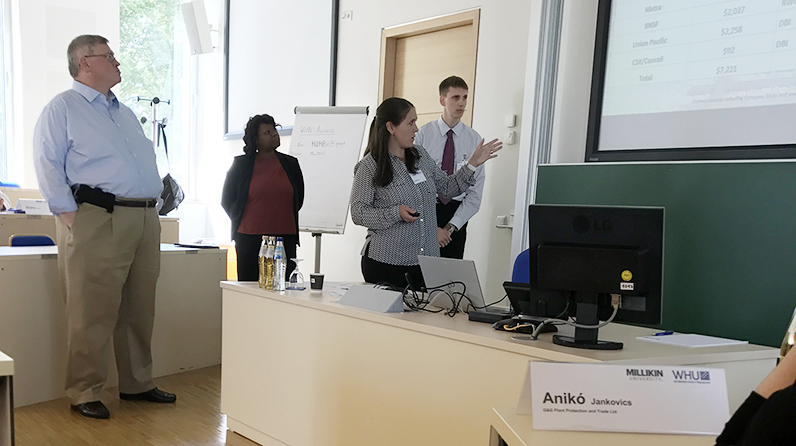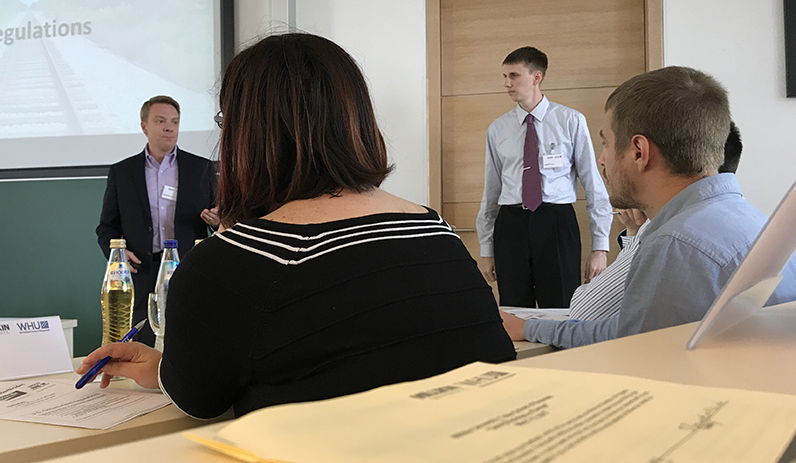"Good market research takes teamwork," said Jacob Kissaw, who earned his Master of Business Administration (MBA) from Millikin University on May 20. Kissaw, from Monticello, Ill., was one of 21 students in Millikin's most recent Executive MBA cohort.
Millikin's Executive MBA is a program designed for professionals who want to advance their careers by developing executive thinking and performance skills. At the end of the program, students engage in an international immersion trip to enhance their global connections; recent trips have included visits to China to Fudan University in Shanghai and Peking University in Beijing to do case competitions and simulations.
Things were different for this year's cohort as students were given a challenging but yet groundbreaking opportunity. For the first time in the Executive MBA Program, students were tasked with advising a company on how they could sell their product in the U.S. market.

Thanks to a connection from Dr. J. Mark Munoz, professor of international management at Millikin, the MBA students worked with G&G Plant Protection and Trade Ltd., a Hungarian-based company that specializes in chemical weed control on railway tracks.
The students created a market entry strategy to help G&G sell their innovative railway weed control technology to the U.S. The students met with G&G executives at the WHU-Otto Beisheim Graduate School of Management in Koblenz, Germany in May to present their strategy. The students spent six months researching and preparing their presentation.
"Being able to work through different ideas with people that think about things differently proved to help our class come up with a comprehensive market entry strategy for G&G," said Kissaw.

The presentation to G&G covered several aspects of the market the company would serve if they entered the United States. The students presented on everything from competition, customers, partners, marketing and market size to laws and regulations.
"We were able to give G&G a list of key challenges or hurdles they may face when they enter the United States," said Kissaw. "This was in an attempt to better prepare them for certain pitfalls that they might not see coming because of how different the market is in the United States."
We've always done competitions with other MBA teams, as well as projects, simulations and cases, but this is the first time our Executive MBA team has been able to advise a company. This is groundbreaking for us.
Maintenance of railway tracks is a basic requirement of safe train service. Railway weed control is important because weedy tracks increase the risk of accidents. Weeds form a slippery area between the rails and the wheels, and it lengthens the braking distance. To prevent this, G&G has developed a weed recognition spray system that has more benefits in terms of cost, environmental protection and safety. G&G says they do spot spraying as oppose to their competitors who do blanket spraying. As a result of the spot spraying, there is 50-60 percent less chemical used.
In addition to their railway weed control technology, G&G also manufactures parts and provides rail industry service support. Currently, rail systems in Belgium, the Netherlands, Sweden, Denmark, Norway, Hungary, Spain and Austria are using G&G products.
"We were impressed with the students' presentation," said Bence Molnár of G&G Plant Protection and Trade Ltd. "We knew that they were entering a new field of business which they would be somewhat unfamiliar with in the beginning, but the class did a great job of identifying the key elements of the industry, and the main barriers we should overcome as a company if we are to enter the U.S. market."

When asked if G&G would be implementing any parts of the market strategy, Molnár said, "There were several great ideas we will clearly consider and some of them are going to be done for sure in the very near future. Our company is going to attend the Railway Interchange Exhibition in Indianapolis this September, which is going to be our second appearance in the U.S., and we will implement some of the marketing strategy ideas presented by the students. As a small family owned company, we honestly appreciate the work the students have done for us."
Dr. Anthony Liberatore, director of the MBA Program at Millikin, noted, "I think what's important is that the students are seeing this from the CEO's perspective. Because they've had enough work experience, the students understood the crucial things to focus on during their presentation."
"The team provided a lot of value for G&G," said Liberatore. "We've always done competitions with other MBA teams, as well as projects, simulations and cases, but this is the first time our Executive MBA team has been able to advise a company. This is groundbreaking for us."
Looking back on his experience, Jacob Kissaw, who currently works at Archer Daniels Midland Co. (ADM), says the program opened his eyes to how complex the world of business is and the importance of each moving part.
"I learned a lot of important concepts during the Executive MBA Program," said Kissaw. "The biggest takeaway I will have from the program is the ability to think about things differently. The program provided valuable insights into many areas of business, some that I did not even think existed. The program gave me a lot of tools to add to my toolbox that will help me achieve my career aspirations."